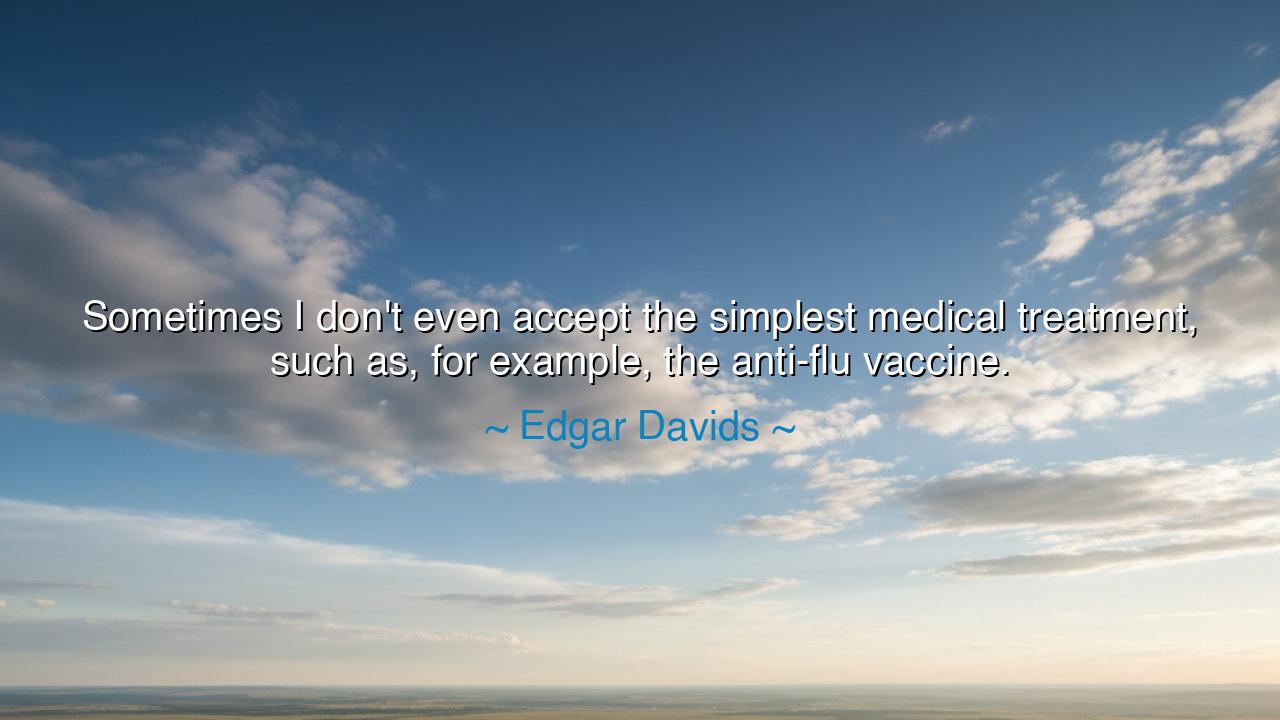
Sometimes I don't even accept the simplest medical treatment
Sometimes I don't even accept the simplest medical treatment, such as, for example, the anti-flu vaccine.






The words of Edgar Davids—“Sometimes I don’t even accept the simplest medical treatment, such as, for example, the anti-flu vaccine.”—reveal the tension between human independence and human vulnerability. They are not merely a statement of preference, but a glimpse into the ancient struggle of mankind: the desire to be self-reliant, to endure without aid, to trust in the body’s strength rather than in the works of science. In these words is a spirit both defiant and reflective, reminding us that even in an age of medicine, the human soul often resists surrendering its fate to another’s hand.
The deeper meaning lies in the conflict between control and trust. To accept medicine is to place faith in forces outside oneself: the physician, the researcher, the healer who labored to create cures. To reject even the simplest treatment is to cling to autonomy, to claim mastery over one’s own body and destiny. This is a noble impulse, for independence is a cherished virtue. Yet it can also be a dangerous one, for in refusing the tools of healing, one risks not only oneself but sometimes the lives of others. Davids’ words remind us that choice is sacred, but every choice bears consequence.
The ancients knew this tension well. When the great plague struck Athens during the Peloponnesian War, many turned away from the healers and the rituals alike, believing that neither medicine nor gods could save them. Some relied on their own strength, others despaired entirely. Yet Thucydides, who survived the plague, recorded that those who resisted aid often perished quickly, while those who embraced both care and community endured. The lesson was clear: independence is honorable, but wisdom lies in discerning when to stand alone and when to accept the hand extended in help.
History gives us another example in the life of George Washington. In his final illness, he refused medical intervention for hours, fearing it would only worsen his condition. He desired to let nature take its course, holding firm to his independence. Yet, by the time physicians were called, it was too late to save him. His dignity remained, but his life was shortened. Like Davids, Washington revealed the human reluctance to yield to treatment, and the tragic balance between pride and prudence.
The emotional force of Davids’ words is heightened by his status as an athlete, a man known for strength, endurance, and resilience. To such a one, the notion of relying on a simple vaccine may seem almost unnecessary, a surrender of the body’s natural power. Yet his statement also reflects the broader skepticism that often arises around medicine: a reminder that trust in science is not universal, and that each soul must wrestle with its own doubts before embracing or rejecting care.
The lesson for us is profound: freedom of choice must be honored, but choices must be weighed with wisdom. To reject treatment without thought may bring needless suffering, while to accept blindly without reflection may rob us of agency. The path of virtue lies between: to examine, to question, to reflect, and then to decide in light of both reason and responsibility. In matters of health, one’s decision affects not only the self but the community, for sickness spreads, and healing often protects more than just the individual.
Practically, this means cultivating both humility and discernment. Seek knowledge before rejecting what is offered. Consult trusted sources, weigh risks and benefits, and remember that medicine is not the enemy of strength, but often its ally. At the same time, honor the voice within you that demands autonomy, for true healing does not enslave—it cooperates with the will of the patient.
Thus, Edgar Davids’ words stand as a reminder of the eternal struggle: to be strong, yet wise; to be free, yet responsible; to choose for oneself, yet remember the bond we share with others. To future generations, let it be taught: independence is noble, but wisdom is higher still. The greatest strength lies not only in enduring alone, but in knowing when to accept the gifts that others have labored to provide for our survival.






AAdministratorAdministrator
Welcome, honored guests. Please leave a comment, we will respond soon